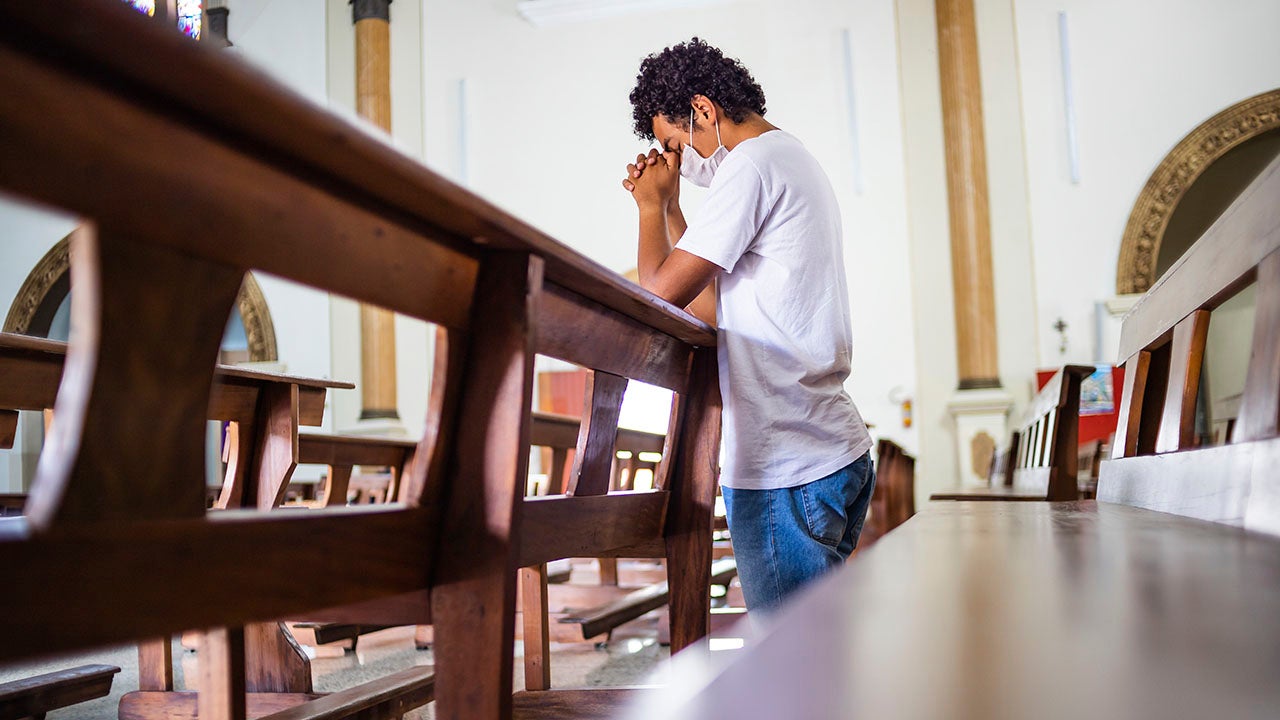This year has changed us all in profound and long-lasting ways. During 2020, we have experienced the Covid-19 pandemic, a multi-faith and multi-generational movement against anti-Black racism, a contentious election season, and so much more. Many of us have had to cope with grief, loss, and anxiety about what the future holds. Yet, for many individuals of diverse faith traditions, the last six weeks of the year are also time to commemorate important holidays and festivals.
Although these holidays couldn’t be celebrated in their normal ways, they still represent important values and traditions for many communities. They provide many the chance to pause, reflect, and connect with loved ones. Drawing upon our friends, past speakers, and members of our Powering Pluralism Network, the Inclusive America Project set out to learn about Diwali, the Day of Covenant, Gurpurab, Hanukkah, and Christmas, and what it meant to celebrate these days in the context of this past year.
Below are short reflections on these holidays from faith leaders including a college chaplain who celebrated Diwali virtually with her students, a reverend explaining how the Advent season has taken on a new and deeper meaning for her this year, and more.
Diwali (November 14th)
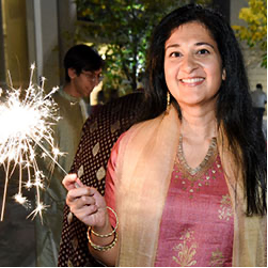 Asha C. Shipman, Director of Hindu Life at Yale University Chaplain’s Office
Asha C. Shipman, Director of Hindu Life at Yale University Chaplain’s Office
Diwali (also known as Deepavali) is a five-day Hindu festival associated with many sacred stories, social observances, and family traditions. Diwali celebrates the triumph of good over evil, knowledge over ignorance, and hope over despair.
Usually, the Yale Hindu Students Organization (HSO) and I celebrate Diwali by hosting an event with around 400 members of our community. We offer prayers to Goddess Lakshmi, the patron deity of wealth and well being, and then share blessed food: a vegetarian Indian dinner and sweets.
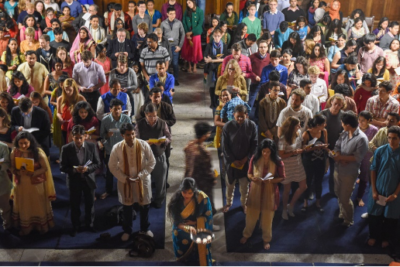
2015 Yale Diwali puja āratī © Mara Lavitt
Our inability to gather in person this year hit me hard, as I always look forward to the fellowship, radiance, feasting, and prayer associated with Diwali—and especially my role as host. At a time of such global peril, it felt like a double blow to not be offering prayers to a deity who facilitates well being. To celebrate together while still apart, I posted cooking videos, and our HSO hosted a virtual Lakshmi puja over Zoom. This was our way to nurture and celebrate with our community while offering prayers for well being and hope to those affected by the global traumas of 2020.
Day of Covenant (November 24th – 25th)
 Saba Ayman-Nolley, Professor Emerita at Northeastern Illinois University, President of Hyde Park and Kenwood Interfaith Council, and Powering Pluralism Network member
Saba Ayman-Nolley, Professor Emerita at Northeastern Illinois University, President of Hyde Park and Kenwood Interfaith Council, and Powering Pluralism Network member
For Bahá’ís, the Day of the Covenant commemorates the life and service of `Abdu’l-Bahá (1844-1921 CE), appointed by Bahá’u’lláh as the “Center of His Covenant” to preserve the unity and integrity of the Bahá’í faith after His passing. On this day, Bahá’ís also reflect upon God’s ancient covenant, the universal promise of divine guidance to all mankind delivered through the Divine Teachers who have founded the world’s religions.
This year, American Bahá’ís especially remember `Abdu’l-Bahá as a bold and tireless champion of racial justice, unity, and the elimination of prejudice. Instead of our customary program at the Bahá’í House of Worship in Wilmette, Illinois, I joined the House of Worship’s live-streamed program, which linked the meaning of this day to America’s most urgent challenge: the elimination of racial prejudice and injustice. While Covid-19 prevented us from meeting in person, Bahá’ís around the world participated via YouTube and Facebook, renewing our commitment to racial reconciliation.
Gurpurab (November 30th)
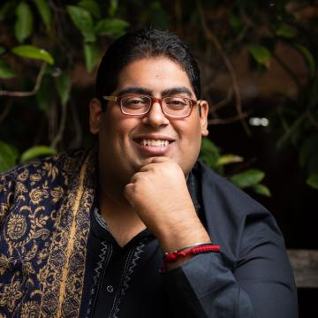 Tahil Sharma, Regional Coordinator for North America at United Religions Initiative and Powering Pluralism Network member
Tahil Sharma, Regional Coordinator for North America at United Religions Initiative and Powering Pluralism Network member
Gurpurab is a reminder of Sikhism’s core values and traditions: curiosity in the face of blind faith, rebellion against tyranny, and service to creation as service to the divine. Guru Nanak (1469-1539 CE), the founder of Sikhism, epitomized these values because he understood the nuances of the world we were born into, which gave him reason to become an advocate for pluralism and justice.
In the context of 2020, the birth of Guru Nanak reminds us to renew our relentless optimism and unapologetic courage that traverses any challenges that may come in our way. The Sikh community knows about turbulent times from its own history, but the community understood that we must fight for everyone else along the way to achieve what is right and what is good. At a time of physical isolation and an unprecedented overlap of injustices, I am reminded of the generosity of my community that continues to feed those in need, provide care to others, and show up to march against unjust systems.
The theology of Sikhism is practiced best in the public square, where all of us benefit from a mutual, transformative abundance. From the Sikhs who stood on the street to proclaim that Black Lives Matter, to the Sikhs who are currently demanding reforms for the rights of farmers back in India, a Sikh never refrains from speaking truth to power and from standing shoulder-to-shoulder with their fellow humans, because they are the Saadh Sangat, or the Community of the Holy, that we are called to support, uplift, and empower.
Hanukkah (December 10th – 18th)
Reflection coming soon!
Christmas (December 25th)
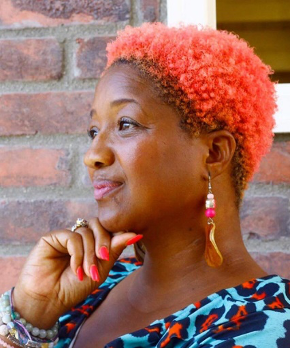 Rev. Dr. Najuma Smith-Pollard, Program Manager at The USC Cecil Murray Center for Community Engagement, and Powering Pluralism Network member
Rev. Dr. Najuma Smith-Pollard, Program Manager at The USC Cecil Murray Center for Community Engagement, and Powering Pluralism Network member
Advent is the time on the Christian calendar where the Church focuses its liturgy on the story of Jesus Christ’s birth; an epoch that begins in Genesis 1. Unlike the Advents of the last 100 years, this Advent has been met with the complications of the global pandemic that has halted the common traditions of the season. Hundreds of thousands have died, family gatherings have been canceled, and “Add to Cart” has replaced long lines in crowded malls (but this was part of the adventure of the season).
On the surface, it appears like Christmas has been stolen by a different kind of Grinch. However, what our communities are showing us is not a departure from Advent or Christmas; but a deeper call to “be the Advent” and exemplify the message of Jesus, who was born to help the hurting. I recently had a call from an anonymous individual, who offered to gift 50 families with groceries and turkeys, and another individual gathered new undergarments and socks to distribute to one of the many homeless encampments in our city. Advent is shifting from a time of celebration to an opportunity to practice hope, love, mercy, and joy!
Additionally, Christmas could not have come at a better time, at the end of a very stressful year. For those who would normally plow through the holiday to work, and others who would use the crunch time to hedge their end-of-year profits, many organizations—like the one I work for—are offering extra days of paid time off and encouraging staff to spend more time with family or with those in their bubble. The pandemic is deepening our awareness around what is important—whether that is spending time with loved ones or responding to cries of injustice—which is the truer meaning of Christmas.
The holidays included in this blog do not cover all of the important days that communities around the United States celebrated and observed, including Kwanzaa , Zartosht No-Diso, and more. IAP wishes all those observing holidays and festivals in these final weeks of 2020 well.
